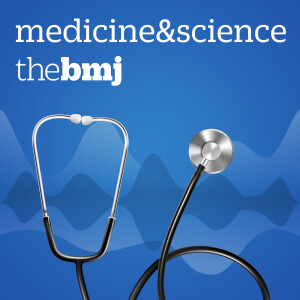
Medicine and Science from The BMJ
Health & Fitness:Medicine

In the first Talk Evidence of 2022, we'll be asking about the evidence for isolation - now that isolation periods are being reduced, or even stopped in the event of a negative lateral flow test, we'll find out what data that's based on, and if it's appropriate.
Vaccinations and treatments for covid-19 have been the one major success story of the pandemic, but that doesn't mean we should abandon the principles of openness and transparency when it comes to scrutinising the data - we'll hear what access to the data which underlies regulatory approval could do now.
Finally, the impacts of climate change were set out in a WHO report in November last year - and recent weather seems to underline their conclusions. We'll discuss new evidence linking the environment and health, and ask what clinicians can do with that.
Reading list:
Mitigating isolation: The use of rapid antigen testing to reduce the impact of self-isolation periods
https://www.medrxiv.org/content/10.1101/2021.12.23.21268326v1.full.pdf
Covid-19 vaccines and treatments: we must have raw data, now
https://www.bmj.com/content/376/bmj.o102
WHO report: Climate change and health
https://www.who.int/news-room/fact-sheets/detail/climate-change-and-health
Ambient heat and risks of emergency department visits among adults in the United States: time stratified case crossover study
https://www.bmj.com/content/375/bmj-2021-065653
Residential exposure to transportation noise in Denmark and incidence of dementia: national cohort study
https://www.bmj.com/content/374/bmj.n1954
Long term exposure to low level air pollution and mortality in eight European cohorts within the ELAPSE project: pooled analysis
view more
https://www.bmj.com/content/374/bmj.n1904
More Episodes
The future of the winter ’flu season
 2023-12-01
2023-12-01
 2023-12-01
2023-12-01
Low carb and cancer screening
 2023-11-06
2023-11-06
 2023-11-06
2023-11-06
Talking overdiagnosis
 2023-09-16
2023-09-16
 2023-09-16
2023-09-16
Planet centred care - Greening the gaze
 2023-08-31
2023-08-31
 2023-08-31
2023-08-31
012345678910111213141516171819
Create your
podcast in
minutes
- Full-featured podcast site
- Unlimited storage and bandwidth
- Comprehensive podcast stats
- Distribute to Apple Podcasts, Spotify, and more
- Make money with your podcast
It is Free
- Privacy Policy
- Cookie Policy
- Terms of Use
- Consent Preferences
- Copyright © 2015-2024 Podbean.com





